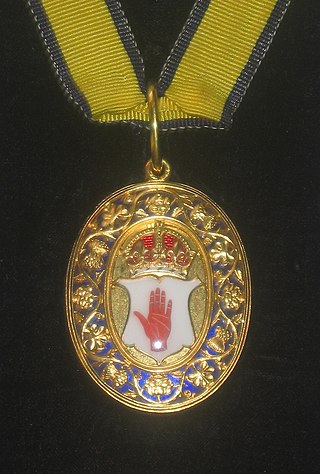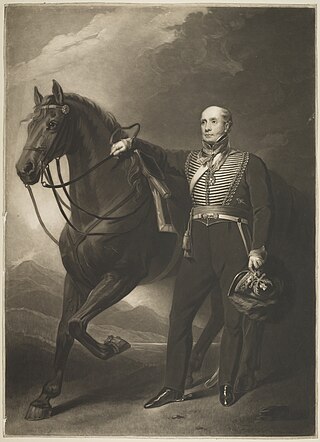Related Research Articles

A baronet or the female equivalent, a baronetess, is the holder of a baronetcy, a hereditary title awarded by the British Crown. The title of baronet is mentioned as early as the 14th century, however, in its current usage it was created by James I of England in 1611 as a means of raising funds for the crown.

Sir Thomas Herbert, 1st Baronet (1606–1682), was an English traveller, historian and a gentleman of the bedchamber of King Charles I while Charles was in the custody of Parliament.
Nineteen baronetcies have been created for persons with the surname Hamilton, eight in the Baronetage of Nova Scotia, one in the Baronetage of England, five in the Baronetage of Ireland, one in the Baronetage of Great Britain and four in the Baronetage of the United Kingdom. As of 2008 two creations are extant, two are dormant, two are either extinct or dormant and twelve extinct.
Sir Maurice Eustace, 1st Baronet was an Irish gentleman, the only holder of the Eustace Baronetcy of Castle Martin in County Kildare, which was created for him in the Baronetage of Ireland on 23 December 1685.
There have been eight baronetcies created for persons with the surname Graham, two in the Baronetage of Nova Scotia, two in the Baronetage of England, one in the Baronetage of Great Britain and three in the Baronetage of the United Kingdom.

The Baronetcy of Mainwaring of Over-Peover has twice been created for members of the family of Mainwaring of Over-Peover, Cheshire. It was created on 22 November 1660 by Charles II on his restoration, for Thomas Mainwaring, High Sheriff of Cheshire in 1657 and Knight of the Shire otherwise Member of Parliament for Cheshire in 1660. The baronetcy was extinct on the death of the 4th Baronet. However his widow remarried and her son by the second marriage Thomas Weterall eventually inherited the Mainwaring Cheshire estate and changed his surname to Mainwaring. The baronetcy was recreated in the Baronetage of the United Kingdom on 26 May 1804 for Henry Mainwaring, son of Thomas Weterall Mainwaring. It was extinct on the death of the 5th Baronet in 1934.
Sir Nicholas Bacon, 1st Baronet, of Redgrave, Suffolk, English Member of Parliament. In 1611 he became the first man to be made a baronet. Bacon would serve on many commissions. The Privy Council constantly called upon him to conduct inquiries. He was a puritan leader in Suffolk. The power and prestige of the puritan ministries in many areas of the country owed their power to Bacon. Sir Nicholas Bacon was considered a good Christian by his contemporaries. Especially his chaplain, Robert Allen. Robert Allen stated that Sir Bacon's wife was dedicated to "God's holy religion and worship by every good and Christian means in the sight of men."

Sir Coplestone Bampfylde, 2nd Bt., DL, JP of Poltimore and North Molton and Warleigh, Tamerton Foliot, in Devon, was an English politician who sat in the House of Commons at various times between 1659 and 1689.

There have been three baronetcies created for persons with the surname Meredith, one in the Baronetage of England, one in the Baronetage of Nova Scotia and one in the Baronetage of the United Kingdom. Two of the creations are extinct while one is dormant.
Sir William Ayloffe, 1st Baronet, of Braxted Magna in Essex, was knighted by James I in 1603, created a baronet in 1612 and sat as a Member of Parliament (M.P.) from 1621 to 1622.
Sir Benjamin Ayloffe, 2nd Baronet was an English landowner and politician who sat in the House of Commons from 1661 to 1662. He supported the Royalist cause in the English Civil War.
Sir William Ayloffe, 3rd Baronet was an officer in the Royalist army during the English Civil War.
Rev. Sir John Ayloffe, 5th Baronet was an English clergyman, Rector of Stanford Rivers in Essex from 1707 until 1730.
Sir Benjamin Ayloffe, 4th Baronet of Great Braxted, was a London merchant.
Thomas Wotton, was an English antiquarian and genealogist, best remembered for his work The English Baronetage.
Francis Hawley, 1st Baron Hawley was an English politician, soldier and peer.
Sir Thomas Barnardiston, 2nd Baronet was an English nobleman and Whig politician.
Maurice Berkeley, 3rd Viscount Fitzhardinge, known as Sir Maurice Berkeley, Bt from 1660 to 1668, was an English politician, of the Bruton branch of the Berkeley family.

Sir John Hope, 11th Baronet was a Scottish aristocrat and politician.
References
- 1 2 Wotton, Thomas (1741). The English Baronetage: Containing a Genealogical and Historical Account of All the English Baronets, Now Existing: Their Descents, Marriages, and Issues ... London: T. Wotton. p. 360.
- ↑ Wiggins, Kenneth (2001). Anatomy of a Siege: King John's Castle, Limerick, 1642. Boydell & Brewer. p. 88. ISBN 978-0-85115-827-3.
- ↑ G. E. C., The Complete Baronetage, vol. ii (1902) pp. 438-439.
- ↑ Stephen, Sir Leslie; Lee, Sir Sidney (1894). Dictionary of National Biography. London: Smith, Elder & Company. p. 271.